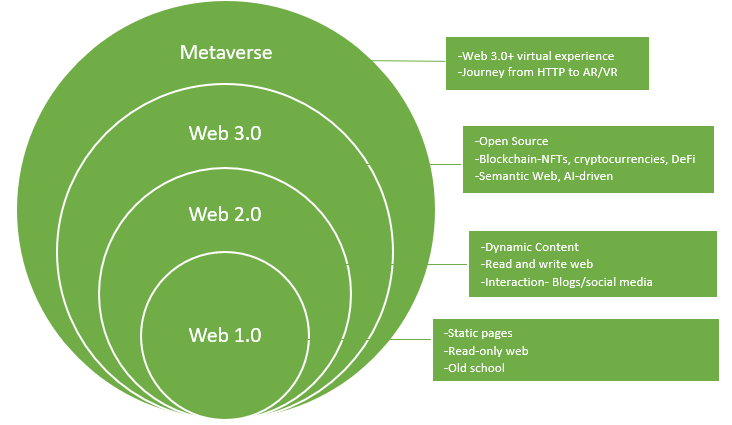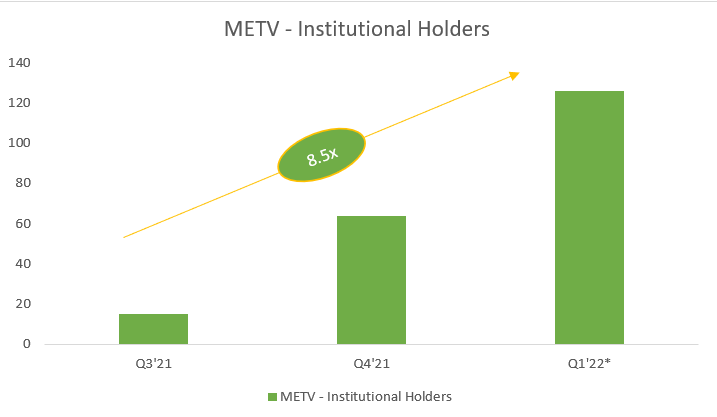Metaverse – A Multi-decade theme for investors!
The Internet is ready to fully transform into the Metaverse.
Multiplayer videotape games are early attempts in the metaverse space, with the focus shifting towards different use cases on the lines of social commerce, plant cooperation, and virtual experience. As the metaverse-grounded technology matures, further use cases will crop online. The metaverse assiduity is anticipated to expand to USD 800 billion by 2024 and cater to one billion individuals by 2030.
Substantial population ready for metaverse relinquishment
Young people are acquainted with the idea of ‘gaming’ and spend a considerable quantum of time online, and will eventually take to virtual realities or virtual worlds.
Gen Z (30% of the world population) will lead the metaverse relinquishment that will see a gradual transition from gaming to other forms of mortal conditioning.
Roughly 38% of Gen Z and 48% of millennials believe that the metaverse will become part of their lives in the coming 10 years.
Big tech companies race to capture the top spot across the metaverse value chain
Several tech and affiliated companies see a lot of potential in this space and are investing heavily. The rebranding of Facebook as Meta Platforms and Microsoft’s accession of Activision Blizzard set the tone. Others, down the chain too, are developing products or technologies to overcome colorful challenges related to the metaverse.
Metaverse-related investment products on the rise
Roundhill Ball Metaverse Exchange-traded fund (Ticker META), the world’s first ETF, was launched in June 2021. Several similar ETFs have hit the request also across the globe. South Korea has been the colonist in metaverse investments in Asia; 10 similar ETFs are listed on the Korea Stock Exchange.
Internet Elaboration
The first stage of the Internet’s elaboration was launched in 1991; it substantially included “consumers” of content with static runners hosted on ISP-run web servers. In 2004, Web2.0 (the “social web”) was launched, enabling druggies to produce content and alter the way web runners were used. The third stage of the Internet’s elaboration, Web3.0, comprises Blockchain and Smart Contracts; on Web3.0, also known as the ” normalized web”, data is participated rather than possessed. The coming stage of the Internet’s elaboration is related to creating an “alternate virtual experience” encompassing all the features of Web3.0 plus new technologies similar to stoked reality (AR) and virtual reality (VR).

Living inside the Internet – Metaverse
The COVID- 19 epidemic drove the confluence of physical and digital, together with the development of reciprocal and rising technologies. The metaverse is considered the coming generation of the Internet, a virtual, connected reality seamlessly entwined with the physical world.
Gaming was the first assiduity to witness the benefits of the metaverse; presently, millions of druggies gather at virtual 3D musicals, shop at virtual promenades, mingle, and enjoy immersive commerce.
- It’s a platform where inventors develop their worlds in a virtual terrain, giving people the chance to witness a life that’s distinct from the real world.
- Access to new technologies similar to AR, VR, XR, Digital Twins, and AI can enhance the effectiveness of diligence, including manufacturing, education, healthcare, and retail.
- Virtual currencies and trading in virtual objects can produce new openings to redistribute wealth.
- Brand-new social status can be endured in simulated communities by developing a distinct icon for oneself and involving in social conditioning.
New macrocosm for the new generation
Mindfulness
86% of Gen Z and 81% of millennials are familiar with the metaverse.
Furthermore, more than 66% of people in India, China, Peru, and Saudi Arabia are positive about the relinquishment of XR, compared to lower than a third in advanced nations similar to Canada, the UK, France, and Germany.
Consumers and businesses are continuously exploring the eventuality of the metaverse as it’s still in its immaturity.
Technology
Children spend nearly 8.5 hours a week on VR bias, substantially for entertainment purposes similar to playing videotape games or watching pictures.
For a metaverse experience, consumers use bias similar to VR headsets and AR spectacles. As per a check, 43% of consumers bought a VR device for their children.
Gaming
Roughly 77% of millennials and 81% of Gen Z associated themselves with the gaming community in 2021.
Gen Z and millennials spend around 11 hours a week playing videotape games; Gen X isn’t far before, with nearly 10 hours of gameplay per week.
Around 89% of people in Brazil, 78% in Germany, 75% in the UK, and 63% in Japan play videotape games regularly.
Virtual Spending
Around 25% of in-game shoppers are aged 26 – 46, while 8% are over the age of 46 years.
Gen Z is willing to try new ways of online shopping and conform to new technologies.
Consumers spent around USD 54 billion on virtual products in 2020.
Around seven million people from over 200 countries visited Nikeland, Nike’s metaverse store, in less than six months of its induction.
Big tech companies situating themselves to ride this long-term theme
Big tech and media companies have made applicable moves in the metaverse theme, in line with their core business strengths. They see long-term eventuality in the metaverse theme.
• Facebook has rebranded as Meta and plans to spend USD 10 billion on research efforts related to metaverse development. The company is likely to continue investing at this scale over the next few years.
• Microsoft’s Mesh is a collaboration and communications platform that enables presence and shared experience from anywhere on any device through mixed reality applications.
• Amazon has incorporated early metaverse in its marketplace. Its AR shopping tool, Room Decorator, allows users to use their phone or tablet to see how the furniture or other home décor would appear in their space.
• Nvidia launched the world’s first technology platform, enabling global 3D design teams to collaborate in real-time in a shared space at multiple software speeds. About 700 companies are evaluating Nvidia’s “Omniverse platform.”
• Alphabet looks to deploy new products on a blockchain-based platform to tap into the huge opportunity stemming from multimodal searches via the in-depth application of AI.
• Tencent invented LuoBuLesi, an online gaming platform allowing users to play games developed by other users while operating a virtual avatar; it is called “Roblox of China.”
• Qualcomm has opened Extended Reality (XR) Labs in Europe to tap into a thriving AR/VR community and is committed to making XR the future of mobile computing.
• Apple’s App Store has over 14,000 AR Kit apps that provide incredible AR experiences for millions of people. The company sees a lot of potential in this space and is investing accordingly.
Metaverse-specific investments gathering pace
Microsoft –
Activision acquisition
Transaction value: USD 68.7 billion
This accession will accelerate the development of Microsoft’s gaming unit across platforms similar to mobile bias, PC, pall, and press while furnishing structure blocks for the metaverse. The thing is to make it simpler for people to enjoy good games the way they want and structure what happens to come for gaming as platforms analogous to the metaverse crop.
Take-Two Interactive –
Zynga acquisition
Transaction value: USD 12.7 billion
Leading interactive entertainment inventor Take-Two Interactive Software, Inc. has completed its combination with the mobile gaming mammoth Zynga. The ultimate is poised to launch its demoiselle NFT experience in 2022 and expand its roots into the Web3 Space as the company aims to enhance its virtual experience.
Alphabet (Google) –
North acquisition
Transaction value: USD 180 million
Google, a colonist in AR, stated that the North’s accession would help the company realize its vision of ambient computing where ubiquitously connected biases work together.
Unity –
Weta Digital acquisition
Transaction value: USD 1.6 billion
Weta Digital’s innovative VFX tools could drive further development of Unity Software’s RT3D(real-time 3D) technology that druggies can enjoy within the metaverse.
Epic Games –
Spaces acquisition
Funding round: USD 1 billion
Epic Games completed a USD 1 billion round of backing from Sony Group and several other investment mates to support its long-term vision related to the metaverse. Its vision includes accelerating the development of connected social guests within games and empowering inventors and generators with the needed tools and services.
(Metaverse – Mapping Investment Opportunities | Aranca, n.d.)
Investor sentiment turns bullish toward this theme
The metaverse is still in its infancy; nonetheless, the world’s first metaverse ETF, METV, highlights that investors are bullish on the sector, with institutional investors growing ~8.5x in just a few quarters.

Source: Aranca
Some prominent institutional investors’ thoughts on the metaverse are given below:
- Morgan Stanley calls the metaverse the next big investment theme and views the metaverse as a USD 8 trillion market.
- Goldman Sachs believes that the metaverse can be a USD 8 trillion opportunity. The predictions are based on the recent dialogues at the Goldman Sachs show titled Understanding Metaverse and Web 3.0.
- Blackrock believes that 2022 will be a game changer for the metaverse as technology giants are investing massively in this space.
- GM Advisory Group (GMAG) calls the metaverse the next iteration of the Internet where immersive and hyper-realistic digital experiences will be the new norm rather than expectation.
- Raymond James & Associates, Inc. believes that the metaverse has joined cloud computing and 5G, lifting business plans for tech spending to record levels in the future. The earning power of the metaverse will continue to explain its high valuations.
Reference :
- Menezes, C. (2022, August 3). Metaverse – Mapping Investment Opportunities. Aranca. Retrieved October 15, 2022, from https://www.aranca.com/knowledge-library/special-reports/investment-research/metaverse-mapping-investment-opportunities

